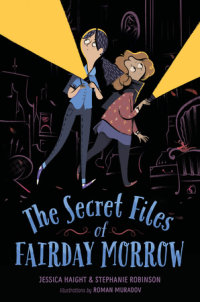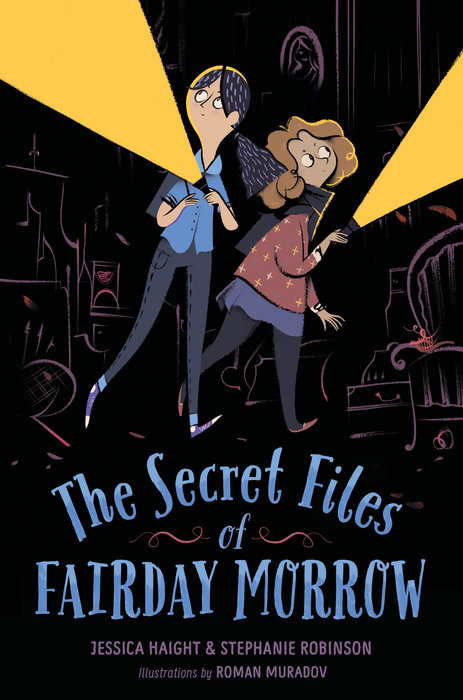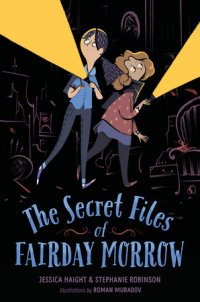The Secret Files of Fairday Morrow
Fans of classic detective stories, The Mysterious Benedict Society, and the Secret Series will devour this illustrated middle-grade adventure that follows three curious sleuths as they investigate a mysterious, old house with some hidden secrets.
Eleven-year-old Fairday Morrow is less than thrilled that her family is moving thousands of miles from civilization to the quiet country town of Ashpot, Connecticut, where she’s absolutely certain she’ll die of boredom.
As if leaving New York City and her best friend, Lizzy, the only other member of the elite Detective Mystery Squad (DMS), weren’t bad enough, Fairday is stuck living in the infamous Begonia House, a creepy old Victorian with dark passageways, a gigantic dead willow tree, and a mysterious past.
Before she can even unpack, strange music coming from behind a padlocked door leads Fairday up a spiral staircase and into a secret room, where an ancient mirror, a brass key, and a strange picture of a red-haired lady are the first in a series of clues that takes the members of the Detective Mystery Squad on an amazing adventure.
"The novel builds to an exciting climax that takes magic in stride and suggests that further mysteries await the DMS trio."-Publishers Weekly
"This paranormal mystery will be of interest to young readers looking for something spooky but not violent or scary."-Booklist
An Excerpt fromThe Secret Files of Fairday Morrow
ONE
The Begonia House
Fairday Morrow couldn’t help empathizing with Dorothy: she was definitely not in Kansas anymore. She stared out the car window at the passing trees and fields, not quite seeing all the endless possibilities her parents talked so cheerfully about. It wasn’t fair, moving to stupid Ashpot. Fairday wished she weren’t leaving her life in Manhattan behind, and even though she doubted she’d find any real friends, she hoped to connect with someone in the small Connecticut town.
The Morrow family cruiser bumped and jerked down the road as Fairday’s two-year-old sister, Margo, giggled noisily, bouncing along in her seat. Auntie Em, the family pug, was resting next to Fairday, letting out a light snore every now and then. Giving her dog a scratch between the ears, Fairday turned her attention back to the book resting in her lap. It was one of her most prized possessions, and just the sight of it improved her mood. She smiled as she remembered her grandma reading her The Wizard of Oz for the first time. Fairday was only four years old. She’d fallen in love with the characters because of the enchanting voices her grandma had used for each one. Not long after, the Morrows had adopted a puppy, and Fairday had named her Auntie Em because the little dog was always frowning like Dorothy’s aunt. It was funny that even when they’d first brought her home, Auntie Em hadn’t resembled Toto; she’d never had that kind of energy.
Fairday began to lose herself in the sway and motion of the ride and relaxed into the story. Suddenly, Margo belched up milk all over the backseat. “Great,” Fairday muttered, grasping the book protectively to her chest, “just great.”
“Oh, Margo, you’re such a messy baby!” Mrs. Morrow chirped as she reached back and wiped milk off Margo’s face, which now sported a wide grin. She handed the towel to Fairday. “Here you go, sweetie, wipe it off with this.”
Fairday took the wet towel and dropped it on the car floor in disgust. “Why are we moving, again?” she asked.
“We’ve already gone over this, Fairday,” Mr. Morrow chimed in. “Your mother and I have a wonderful vision of our family’s future, and we’re going to make it a reality. With her interior design skills and my wizardry in the kitchen, the Begonia House Bed-and-Breakfast is sure to be a smash hit. Trust me, you’re gonna love it!”
“Not good enough, Dad,” she replied, having yet to get an answer that satisfactorily justified this kind of treachery.
“Well, my dear, it will have to do!” And with that, Mr. Morrow began to sing loudly to the song on the radio. Mrs. Morrow joined in and they were gone, off to la-la land. Fairday sat back in her seat and closed her eyes, doubting that she was “gonna love” the Begonia House, as her father had so optimistically predicted. She doubted it a lot.
The car made a sharp right turn as it began to ascend the narrow, winding road that led to the Begonia House. Fairday glanced out the window, and other than the rough road that tossed them about, she could see nothing but a tangled mesh of woods that seemed to spread over the entire hill. Margo had fallen asleep, and her parents had stopped talking, so it was quiet in the car as they trundled up and up. Finally, as the road began to level out, they reached the front gate. It was enormous and made of iron. Twisted vines were wrapped around its pointed black bars, making it look like the entrance to some kind of morbid secret garden. Across the top of the gate, in large letters, were these words:
FEAR NOT THE UNEXPECTED
“Weird,” Fairday said. “It should say, ‘Fear not living a thousand miles from civilization.’ ”
“Oh, now, Fairday, no eleven-year-old as clever as you ever died of ennui. That’s another word for boredom,” Mr. Morrow said. He had been an English teacher for years and was constantly throwing out “new and exciting” words to improve Fairday’s vocabulary. “I’m sure you’ll find lots to do here. Incidentally, this house has a pretty interesting history, very mysterious. Right up your alley, with your little club and all--the Detective Mystery Squad, right?”
“That’s right!” Mrs. Morrow piped up, turning to face Fairday. “You can invite Lizzy for a sleepover, and you guys can investigate. I’m sure the library has all sorts of information on the history of the house. It’s very famous in these parts, and I’ve even heard rumors that it’s haunted. Wouldn’t that be interesting?” Her mother winked. “After you girls have conducted a thorough investigation, you can fill me in on all the juicy details. If you find something fascinating, we can display it when we open up the Begonia House Bed-and-Breakfast.”
“Humph.” Fairday sulked at the mention of her best friend. Even though the thought of moving into a house that could be haunted was intriguing, the idea of running into a ghost seemed much scarier without Lizzy around. She had met Lizzy Mackerville in the first grade, when Lizzy had moved into Fairday’s neighborhood. At school they had caught sight of each other’s books and realized they had the same taste in stories. During recess, the other kids had made fun of Lizzy because she said You betcha and her accent was different. Fairday had admired how the new girl shrugged off the comments, explaining that everyone in Minnesota talked like her, and her classmates would all sound funny if they moved there. Lizzy’s natural confidence made it easy to be friends with her, and from that day on she and Fairday were inseparable.
Lizzy was short and round, making her seem jolly. Bouncy blond curls framed her heart-shaped face, and she had a bubbly disposition. Fairday was the exact opposite of Lizzy. She was tall and lean, with long black hair that had a mind of its own, so it was always pulled back in a loose ponytail. Her pale face had never had the usual amount of cute baby fat most people cooed over and pinched.
One feature Fairday liked about herself was her eyes. They were an unusual charcoal gray and the reason she had such an uncommon name. Her mother said Fairday’s eyes reminded her of the swirling tides of blue-gray waters that swelled up onto the sandy shores of Nantucket, where she’d grown up. When the weather was less than pleasant on the island, the fishermen would inform the tourists who came to charter their boats, “Jus’ waitin’ on the fair day t’morrow.” And so Fairday was named Fairday Theresa Morrow, or Fairday T. Morrow. Whenever she met new kids, she had to field some annoying criticism in school about it, which went something like, “Fairday? What kind of a name is that?” or “Fairday? More like Bad Hair Day.” But she didn’t care. She liked the story, and she liked her name.
Mr. Morrow found the gate key, which was as black and bizarre-looking as the gate itself, and held it up for everyone to see. It had sharp, skeletal teeth, and the handle was shaped like some sort of grim flower. He made a drumroll on the steering wheel before he exclaimed, “Here we go! I am now opening the gateway to our future!”
He climbed out of the car and walked over to the gate. The key slid easily into the lock, which resembled a wide, gaping mouth, and it clicked as he gave it a turn. He pushed the heavy double gates, and they slowly swung open.
The family was quiet as the car passed through the iron barricade. Auntie Em peered out the window, her nose pressed against the glass. Even Margo was wide-eyed and straining against her car seat straps to check out the scenery. The woods began to thin as they continued toward the house. The drive was now less bumpy, and thankfully they were no longer going up. Mr. Morrow turned the car around a corner, and the outline of an enormous house came into view.
“Here we are!” he said, pulling to the center of the circular drive before putting the car in park. He turned in his seat to face Fairday. “Is it as big as you thought it would be?”
“Uh, yeah,” Fairday mumbled as she looked up at the crooked house. “And just as creepy,” she added.
“Well, let’s get a move on,” Mr. Morrow said as he pushed open the car door.
Mrs. Morrow pulled Margo out of the car seat and lifted her over her shoulder. Margo squealed, pointing at the house. “Uggy, Mommy!”
“See, even Margo thinks it stinks,” Fairday said.
Mrs. Morrow laughed. “Yes, it’s not as beautiful as it once was, I’m sure--”
“But,” Mr. Morrow interrupted, “it will be!” He gave Mrs. Morrow a kiss, made a silly face at Margo, and patted Fairday on the head. “Let’s leave our trunks here for now and come back for them after we’ve had a chance to investigate our new abode. Abode is another word for dwelling, Fairday.” He located the right key and, once again, held it up.
Fairday rolled her eyes. Her father loved to overemphasize everything. Enough with the key drama, she thought. “We get it, Dad,” she said. “New house, key to the future. Can we just go inside now?”
Mr. Morrow unlocked the door without saying anything else. Fairday felt terrible. “I’m sorry. I’m just missing our old home, and it was a long drive,” she said, and hugged her father.
“I know, sweetie. It’s a big move. It will take some time to adjust, but I promise you, this is going to be a real adventure for all of us,” he said, and squeezed Fairday tight.
Two
A Disturbing Note
The Morrows gave each other a nervous look and then walked through the double-door entrance of the Begonia House. Auntie Em waddled into the room, sniffed a few times, and as usual, plopped down in a corner and began to snore. Whoa, thought Fairday. This is definitely going to be different from our town house in Manhattan. She scanned her surroundings; it all seemed impossibly huge and frighteningly old. They were standing in a gigantic foyer with a high ceiling and a wide staircase that spiraled down from the upper level. The cracked black-and-white-checkered floor was coated with a thick layer of filth. Hanging from the ceiling was a crystal chandelier that was so covered in dust it looked like a tinkling blob floating ominously above them.
Time seemed to have stopped. Fairday couldn’t believe the size of the place or how dirty it was. The wallpaper was crumbling, and there were cobwebs hanging from every corner. Even the ancient light fixtures were creepy; they reminded her of those fake candles people put out at Halloween. The air had a stale, funny smell that she couldn’t quite identify, something like burnt popcorn. A cold breeze blew through the doorway and sent a chill down her spine, the hair standing up on the back of her neck. Fairday shivered.
Margo began to wail, snapping everyone out of their trance, and time sped back up to normal. “Okay! Lots to do, lots to do,” said Mr. Morrow, clapping his hands.
“Fairday, why don’t you go and pick out your bedroom while I change Margo. There are quite a few to choose from,” said Mrs. Morrow. She smiled at Fairday and then turned to head back out to the car. “Someone needs a fresh diapy, don’t they? My smelly little oogles,” she said, rubbing Margo’s nose with her own, then disappearing through the door.
As Fairday climbed to the second floor, it sounded like every step was shouting a warning that it was about to give way. The upstairs hallway was lit by flickering sconces, which cast an eerie glow over paintings of people dressed in fancy, old-time clothes. As she walked past them, their eyes seemed to watch her surreptitiously. It made Fairday feel a little uneasy to be under such bizarre scrutiny.
As it turned out, Mrs. Morrow was right. The family’s wing of the bed-and-breakfast had quite a few rooms to choose from. Fairday counted a total of eight doors. There were four on the right and three on the left, and there was one at the end of the hall that had a padlock hanging from it. Puzzled, she walked over and pulled down on the lock to see if it would open, but no such luck.
Abandoning that door, she began opening some of the others. One led to a bathroom that was decorated with striped silver-and-gold wallpaper, another opened to a closet that housed the world’s oldest-looking mop and bucket, and yet another led to what she guessed must have been an office, judging by the antique desk and chairs covered in sheets. The remaining four rooms were bedrooms. All of them were big and had windows draped in long velvet curtains.
The drapes in the room Fairday chose were maroon with silver stripes. A circular carpet with a picture of a lion and a unicorn covered the floor. She thought it was the least gaudy of all the bedrooms and kind of liked the carpet. Her window overlooked the backyard, which was covered with yellow grass and contained one old weeping willow. “Well, this is it, I guess,” she said, looking down at the depressing yard.
Fairday left the room and was heading back down the hall when she heard the strangest sound. It was faint, and it was coming from behind the padlocked door. She walked over and put her ear up against it. Something that sounded like music was coming from behind the door, but really odd music. It was high-pitched and whiny. Was she imagining it? She listened for a minute, trying to think of what could possibly make sounds like that, and then she knew. A few years back, her father had taken her to a Scottish festival in the city. She could picture the men onstage dressed in kilts and playing the bagpipes. The sound they made was unforgettable. It was beautiful but melancholy at the same time. Fairday remembered her father laughing about how he hoped it wasn’t going to be a windy day. He had explained that it was an old joke that Scottish men didn’t wear anything under their kilts, and if a strong wind were to blow, the audience would all get to see more than they had paid for. Fairday couldn’t believe there were people who didn’t wear any underwear. Luckily, it had been a calm day, and the men onstage all kept their skirts on.
Suddenly, there was a long, earsplitting note from behind the locked door. Fairday jumped back. She definitely was not imagining this. Someone was behind the door playing the bagpipes!
She turned and ran, her feet flying down the stairs. In her haste, Fairday accidentally tripped over Auntie Em and bumped into her father. Jolting awake, the dog let out a confused bark, looked around in surprise, and settled back into her snoring.


